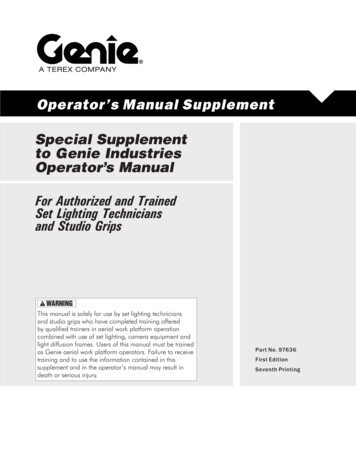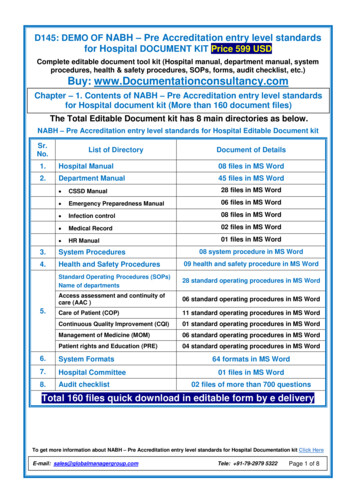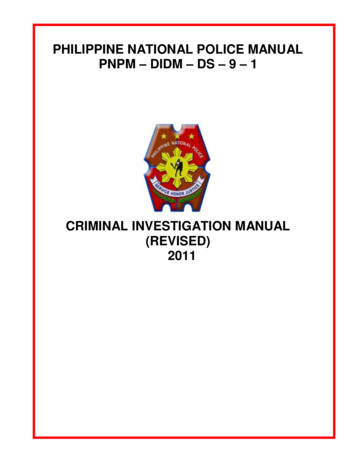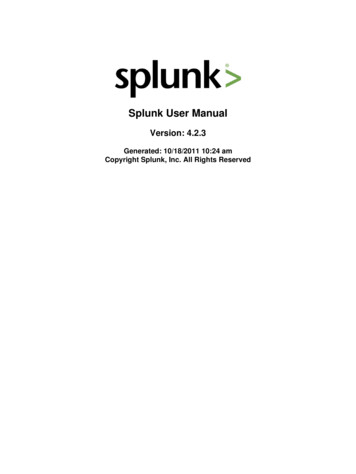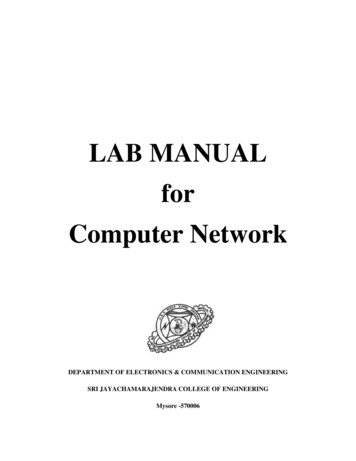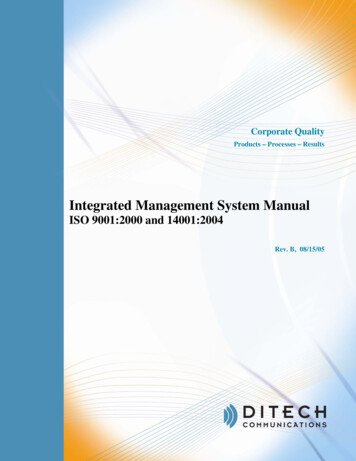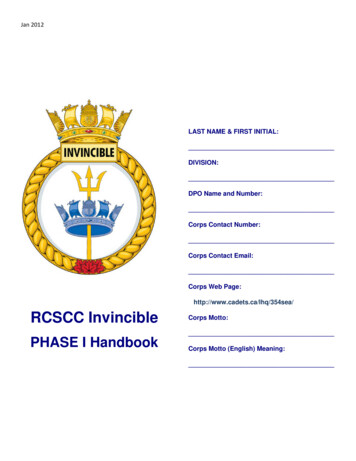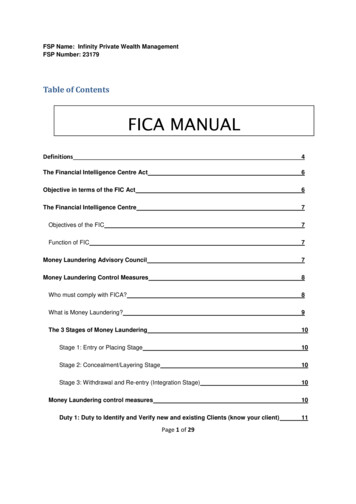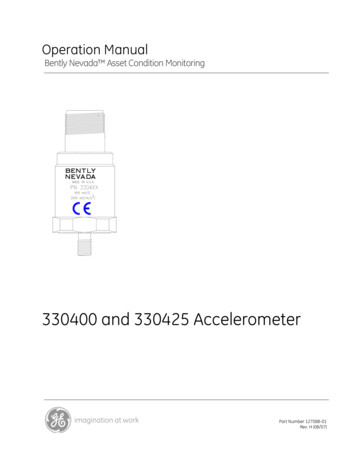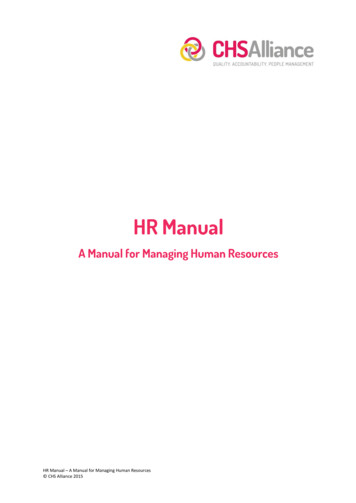
Transcription
HR Manual – A Manual for Managing Human Resources CHS Alliance 2015
CHS Alliance and Radhika Bhagat (Manifest (UK) Ltd)Considerable care has been taken to ensure this document is both accurate and relevant. However,the CHS Alliance is unable to provide any warranty concerning the accuracy, completeness orrelevance to your organisation relating to any information contained herein.This publication may be quoted by not-for-profit organisations, in any form (written, visual,electronic, or audio) without the express permission of the CHS Alliance, provided any and allreferences are fully attributed to the CHS Alliance and this publication.All other requests for permission must be directed to and approved in writing by the CHS Alliance.You can contact the CHS Alliance by email on info@chsalliance.org.All rights reserved.HR Manual – A Manual for Managing Human Resources CHS Alliance 2015
SECTION 1 - INTRODUCTION1.1The Human Resources Manual . 11.2Human Resources function . 21.3The Human Resources manager - Roles and responsibilities . 2SECTION 2 - HUMAN RESOURCE MANAGEMENT2.1Module 1: Recruitment, selection and induction . 62.2Module 2: Performance management. 182.3Module 3: Staff development . 252.4Module 4: Compensation and benefits . 302.5Module 5: Staff duty of care . 362.6Module 6: Separation . 41SECTION 3 -FRAMEWORK OF A NATIONAL STAFF HANDBOOK3.1About the organisation. 463.2Who this handbook applies to . 463.3Organogram/Organisation chart . 473.4Rights of the employer . 473.5Staff responsibility . 473.6Recruitment and selection . 473.7Contract of employment . 473.8Per diems. 583.9Accommodation allowance . 593.10Relocation allowance . 593.11End of contract. 593.12Performance management . 593.13Learning and development . 593.14Disciplinary policy . 593.15Grievance procedure . 65HR Manual – A Manual for Managing Human Resources CHS Alliance 2015
3.16Office property and equipment . 663.17Confidentiality . 663.18Commitment. 663.19Uniforms. 673.20Amendments . 673.21Applicable law . 673.22Validity of the HR Manual . (x)(xi)(xii)(xiii)Recruitment request form - Expatriate staff . 68Recruitment request form - National staff. 70Checklist for incoming expatriate staff (Induction checklist) . 71Contract of employment (for national staff) . 74Regulations for short-term national staff . 77Performance review for expatriate staff (short-term) . 85Performance appraisal form for expatriate staff (long-term) . 87Performance appraisal form for national staff. 90Checklist for leaving expatriate staff . 92Request for staff extension. 93Staff waiver letter . 95Sample exit interview form . 96Start Network/CBHA Core Humanitarian Competencies Framework . 100HR Manual – A Manual for Managing Human Resources CHS Alliance 2015
Overview of the HR ManualThis manual was designed to support HR managers and HR practitioners 1 who are setting up a newHR function within a programme (or organisation), both at head office or in field operations. Itprovides a framework of principles, policies, procedures, guidelines, tools, and templates to serve asa practical guide for HR management in field, regional and/or head offices.Who is this HR Manual for?This HR Manual is primarily for HR managers in the humanitarian and development sector. It isrelevant to all HR personnel, whether working locally, regionally or internationally. It may also beused by HR personnel outside the sector.This manual is also a useful guidance document for programme managers involved in setting up newprogramme offices and managing HR matters in the field.Why use this HR Manual?Past experience in local or field operations confirms the importance of setting up a good foundationof HR systems, policies and procedures early on, especially when an operation is working in itsemergency stages. Ensuring this will provide all staff members with the adequate HR support andguidance to enable them to deliver the required services to the most vulnerable people.Users of this manual should select and adapt the information provided according to the needs andrequirements in their particular organisation, and to the legal framework of the country(ies) ofoperations.The manual is structured into three main areas:i.The introductory section focuses on the use of this HR Manual and the HR function.ii.The second section looks at the HR function and the employee life cycle that should beconsidered in setting up a new HR function: recruitment and selection, performance management,staff development, reward and compensation, staff duty of care, exit/separation.iii.The final section outlines a recommended framework for a national staff handbook.Thisnational staff model could easily be adapted for other categories of staff such as expatiate or local.References to the Core Humanitarian Standard (CHS) on Quality and Accountability are madethroughout the manual to demonstrate the use of the CHS within relevant aspects of HR systems,and as an example of how organisations can implement and self-asses against the CHS.1The term HR manager will be used throughout the manual to represent the many roles that in some way involve HR or peoplemanagement.HR Manual – A Manual for Managing Human Resources CHS Alliance 20151
Commitment 8 of the CHS states:“Communities and people affected by crisis receive the assistance they require from competent andwell-managed staff and volunteers.”In a humanitarian (or development) context, the above commitmentinforms the agenda for the HRfunction. We know that there are many aspects within HR management, and this can make itdifficult to know where to start in setting up the function or to make improvements.This is particularly the case for organisations without a team or department specifically responsiblefor HR management. When there is no dedicated team, it is worth considering giving someoneresponsibility for aspects of HR management as partof their role or as their only role.There are many benefits of having a member of staff or team with ownership of HR. For example: The organisation can be kept up to date on legal issues. A coordinated and coherent approach can be taken with regard to HR strategy, policy andpractice. This helps to ensure that the organisation has a fair and consistent way of treating its staff. Staff have a place to go for advice on issues affecting them (as staff member and/or linemanager). Good policy and practice can be promoted and embedded. Job descriptions and work plans can be kept up-to-date. Staff and line managers then knowwhat to expect and performance can be measured successfully. Recruitment procedures can be thorough and enable the best people to be recruited. Staff briefing and induction is planned and well organised. As the organisation shows it sees HR management as important, staff feel valued and isencouraged to stay with the organisation.Organisations wishing to establish their own HR function may need to gain buy-in and permissionfrom the leadership team of the organisation, including the Chief Executive and the Board.It may benecessary to inform them of the benefits of good HR management (and the risks of a lack of good HRsystems) in order for them to understand its importance. It is worth noting that some donors willprovide funding for activities related to HR management.The HR manager is ultimately responsible for the HR function in an organisation. Below are thebroad roles and responsibilities of an HR manager applicable in most contexts: Develop and manage the HR strategy in liaison with the strategies from the otherdepartments in the organisation. Integrate the HR strategy within the work plan of the HR team andtheir personal objectives. Support HR management and development issues by ensuring that clear and transparent HRprocedures and systems are in place and maintained as necessary.HR Manual – A Manual for Managing Human Resources CHS Alliance 20152
Coordinate the HR planning process, recruitment and selection, briefing/debriefing, staffcare and wellbeing, and management practices and issues. Provide HR guidance and consultative support to managers/supervisors of eachfunction/unit within the organisation and/or field programme. Liaise closely with other support functions such as finance, administration, logistics, legal andsecurity, to ensure all HR systems and procedures are fully integrated and consistent with othersupport systems (e.g. remuneration systems, staff rules and regulations, medical provision,evaluation plans, estate management, rest and recuperation (R&R) policy and security policies). Maintain HR databases and filing systems in compliance with data protection guidelines. Manage the staff in the HR team. Clarify job scope and reporting lines: It is important for HR managers to know early on thescope of their role, the main objectives for any given period, and those they report to and directlyliaise with. Hold managers responsible: Managers are ultimately responsible for managing their staff.You are there to facilitate the process of them managing their staff. Maintain confidentiality and neutrality: Refrain from participating or discussing staffrelated issues casually or informally. Stop rumours: Do not entertain gossip that may cloud your judgment. Politely remindpeople to channel any grievances through the proper outlets. Adapt and be flexible: Tailor-make the resources you have to suit the local context. Take care of yourself: Remember to take care of yourself while taking care of others. Check the existing HR systems and procedures: In most cases, there should already be abasis or traces of HR systems and procedures, if not more, in the country of operation. Ensure you are thoroughly briefed in your role: Ensure you clearly understand what isexpected of you. Read: Read as much background material on the emergency operations including anycountry fact sheets available. Expect different kinds of behaviour: Try to separate the behaviour from the individuals, andunderstand how different cultures behave in different contexts. Privacy: Hold all private discussions in private. HR manual: Ensure you either develop or have a co
Support HR management and development issues by ensuring that clear and transparent HR procedures and systems are in place and maintained as necessary. HR Manual –
